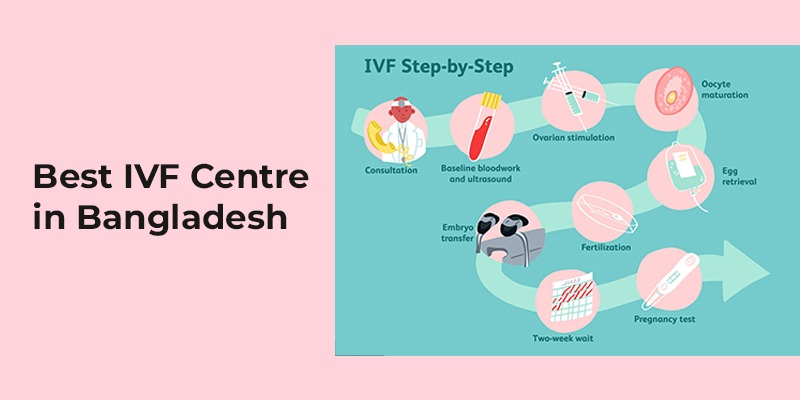If you are unable to conceive even after a year of trying, you may be suffering from infertility. It’s high time to seek help from fertility specialists. Ovulatory problems, endometriosis, a low sperm count, or low testosterone are some of the causes of infertility. The likelihood of infertility rises with age. There are several treatment options. But you must know the reason for your fertility. Only then you can be treated.
What is Infertility?
An issue with your reproductive system called infertility prevents individuals from being able to conceive. There are several reasons for infertility, which may affect anybody. First, let us understand how pregnancy happens. Pregnancy includes a number of steps:
- Reproductive hormones that regulate ovarian function must be produced by your brain.
- Your ovary must allow an egg to develop.
- Ovulation, the release of an egg, is required.
- The egg has to be taken up by your fallopian tube.
- In order to reach your fallopian tube, sperm must ascend your vagina and pass through your uterus.
- An embryo is created when the sperm fertilizes the egg.
- Your fallopian tube transports the embryo to your uterus, where it implants.
If any step in this procedure doesn’t take place, a pregnancy cannot happen.
Fertility Specialist in Bangladesh
When you should visit a fertility specialist?
Here are some key reasons why you might consider scheduling an appointment with a fertility specialist:
If you are under the age of 35 and have been actively trying to conceive for a period of 12 months without success, it’s advisable to consult a fertility specialist. This duration is a general guideline, and individual circumstances may vary.
- Experiencing Three or More Miscarriages:
Miscarriages, defined as the loss of a pregnancy within the first 20 weeks, can be emotionally and physically challenging. If you’ve endured three or more miscarriages, it’s crucial to seek the expertise of a fertility specialist.
Recurrent miscarriages may indicate underlying issues such as chromosomal abnormalities or structural problems with the uterus. A fertility specialist can conduct a thorough evaluation to determine the cause and provide appropriate guidance.
- No Period, Irregular Periods, or Heavy Bleeding:
Irregular menstrual cycles, heavy bleeding, or the absence of periods (amenorrhea) can be indicative of hormonal imbalances or other reproductive health issues. These issues may affect your ability to conceive and should be addressed by a fertility specialist.
- History of Sexually Transmitted Infections (STIs):
If you or your partner have a history of sexually transmitted infections, it’s essential to consult a fertility specialist. Some STIs can lead to pelvic inflammatory disease (PID), which, if left untreated, may cause fertility problems.
If you are trying for a year and not getting success you must get your fertility diagnosed. You must not waste time. Because as you age your fertility decreases naturally.
When you see a fertility specialist, they will conduct a comprehensive assessment, including medical history, physical examinations, and various diagnostic tests. These tests can help identify any underlying causes of infertility or recurrent miscarriages. Based on the findings, the specialist will create a personalized treatment plan to address your specific needs and increase your chances of achieving a healthy pregnancy. Remember that early consultation with a fertility specialist can provide valuable insights and options for optimizing your fertility journey.
Best Fertility Centre in Bangladesh
What happens when you visit the doctor for your fertility checkup?
A thorough medical history and physical examination are frequently part of the initial appointment with a fertility doctor. You will be questioned about your menstrual cycle, unusual vaginal bleeding or discharge, pelvic discomfort, and illnesses like thyroid disease that might impair fertility. You and your spouse will be questioned on any health issues, such as:
- Herbal therapies and prescription and over-the-counter medications
- illnesses, such as STIs and previous surgeries
- Your family history of birth problems
- Previous pregnancies and their results
- alcohol, and tobacco Intake
Additionally, inquiries concerning your sexual history will be made of both you and your partner, including:
- Approaches to birth control
- How long have you been trying to conceive?
- How often do you have contact and whether or not you have problems
If your doctor thinks there is a reason you can’t get pregnant, there are a number of tests that can be done to find out how fertile you and your partner are. Depending on what the pregnancy tests show, you and your partner may be able to choose from a number of options.
What tests are done to check fertility?
You and your partner will need to take tests to figure out why you can’t get pregnant. Sometimes the woman is the trouble. Occasionally with the guy. On occasion, both. And sometimes, no one ever figures out why. Your doctor can tell you to get below fertility tests.
Sperm check (for man)
About one in five, the man is to blame for problems with getting pregnant. Fertility problems can happen when there aren’t enough sperm or when the sperm don’t move the way they should. Your doctor can set up a test of your sperm. The man will be asked to give a sample of his sperm.
Blood test for Ovulation (for women)
When a woman ovulates, her ovaries release an egg into her fallopian tubes. This is closely related to the amount of hormones in her blood. Hormonal changes can make it hard to ovulate, and a blood test can show if this is the case.
Problems with ovulation can also be shown by periods that come and go or don’t come at all. Polycystic ovary syndrome is the most common cause of trouble with pregnancy.
Ultrasound check (for women)
A woman’s ovaries, or uterus, and fallopian tubes can all be checked with an ultrasound. A small ultrasound tool is put in the vagina for a transvaginal ultrasound scan. This scan can help your doctor find out how healthy your ovaries and uterus are.
Some problems with the uterus, like endometriosis and cysts, can make it impossible to get pregnant. The scan can also check for blocks in your fallopian tubes. These are the tubes that connect your ovaries to your uterus. If your fallopian tubes are blocked, eggs may not be able to move along the tubes and into the uterus.
HSG (for women)
This is called an “HSG” (for “hysterosalpingogram”). During an x-ray, a dye is put into your cervix. The color will help your doctors see if any of your fallopian tubes are blocked. Eggs can’t get to the womb if the tubes are blocked, so you can’t get pregnant. This scan checks for blocks in your fallopian tubes. These are the tubes that connect your ovaries to your uterus. If your fallopian tubes are blocked, eggs may not be able to move along the tubes and into the uterus.
Laparoscopic surgery
Laparoscopy, also called “keyhole surgery,” may be done if you have pelvic inflammatory disease (PID) or endometriosis, or if your doctor thinks you do. This is done by making small cuts in your belly (tummy) so that a thin tube with a camera (laparoscope) can be used to look at your uterus, fallopian tubes, and ovaries.
There are three main ways to treat infertility:
- Medicines
- Surgery
- Assisted reproductive Techniques
The medicine
Women
If some small problems with ovulation or PCOD are found after the tests, your doctor will give you some medicines that could help you ovulate. For follicular study, you may have to go to the doctor.
The doctor will measure your eggs and give you HSG hormone injections when the eggs are of the right size and ready to be released. The doctor will keep track of your fertile window and tell you when to contact a partner.
- Clomifene helps women who don’t ovulate every month or who can’t ovulate at all to release an egg every month. Tamoxifen is an option to clomifene that may be given to women who can’t get their eggs to mature.
- Metformin is good for women with polycystic ovary syndrome (PCOS) in particular.
- gonadotrophins can help women get pregnant by making them ovulate. They may also help guys get pregnant.
- Gonadotrophin-releasing hormones and dopamine agonists are two other kinds of medicine given to women to help them ovulate.
Men
The amounts of testosterone or other hormones can be raised by medicines. There are also medicines for erectile dysfunction that can help you keep an erection while you’re making contact with your partner.
Surgery
There are different kinds of surgeries that can be used to find out what’s wrong with you and why you are not able to conceive.
- Surgeries in Women
- Surgery on the fallopian tube
If your fallopian tubes are blocked or have scar tissue on them, you may need surgery to fix them. Scar tissue in your fallopian tubes can be broken up with surgery, making it easier for eggs to move through them. How well surgery works will depend on how badly your fallopian tubes are hurt.
Tubal surgery may be required in case of ectopic pregnancy. It is a kind of pregnancy that happens when the fertilized egg settles somewhere other than the womb.
- Surgery to correct Endometriosis, fibroids, and polycystic ovary syndrome (PCOS)
Endometriosis is a disease in which tissue that looks like the lining of the uterus grows in places other than the uterus.
Cysts, which are fluid-filled sacs, are often destroyed or taken out during laparoscopic surgery to treat endometriosis.
It can also be used to get rid of small growths in the womb called submucosal fibroids.
If the medicine to help you ovulate hasn’t worked and you have polycystic ovary syndrome (PCOS), a small surgery called laparoscopic ovarian drilling can be done. For this, either heat or a laser is used to kill off part of the ovary.
- Surgeries in man
- Fixing a blocked epididymis and having surgery to get sperm
The epididymis is a structure in the testes that looks like a tube and helps store and move sperm. Sometimes the epididymis gets clogged, which makes it hard for sperm to come out properly. If this is making it hard to have children, treatment can fix the problem.
Sperm extraction through surgery may be a choice if:
- have a blockage that keeps sperm from getting out.
- were born without a tube (vas deferens) that draws sperm from the testicle.
- Have had a vasectomy or a vasectomy reversal that did not work
Surgical extraction is usually done with local anesthesia, but based on the type of treatment, it could be done with general anesthesia. Any sperm will be frozen and stored so that it can be used in the future.
Assisted reproductive Techniques
- IUI or intrauterine insemination.
Intrauterine insemination, or IUI treatment, is a professional method used to help couples who are having trouble getting pregnant. Most of the time, IUI can be done by couples who have been trying to get pregnant for over a year but haven’t been successful. This is the first treatment a doctor will suggest if the medicine doesn’t work.
Why IUI is done?
It is mainly done if there is
- Mild Male infertility
- Hostile Cervical Mucous
Fertilization is the process by which sperm from a male and an egg from a join together to make a baby. The fallopian tube is where this happens. Now, infertility happens when sperm cells can’t reach the egg or the environment in and around the cervix or Vagina isn’t good enough for sperm cells to live. IUI gets around this system by putting the sperm cells directly in the uterus. This dramatically increases the chances of fertilization, as long as your fallopian tubes are open.
How is IUI done?
As part of the IUI process, your partner’s sperm cells are taken. These will be washed and looked at to make sure that only the best sperm cells are used in the treatment. Through an IUI tube, this highly concentrated sample of healthy sperm cells is then put into the uterus of the woman.
- IVF or “in vitro fertilization.
IVF is the process of fertilizing an egg outside of the body. People take fertility medicine to get their ovaries to make more eggs than normal. Eggs are taken out of the ovaries and fertilized in a lab with sperm. The fertilized egg now called an embryo, is put back into the uterus to grow and develop.
Why IVF is done?
Blocked Fallopian Tubes and Female Infertility: When a woman faces the challenge of blocked fallopian tubes or experiences major female infertility issues, IVF can be a ray of hope. In such cases, the natural pathway for the sperm to meet the egg is obstructed. IVF circumvents this obstacle by retrieving eggs directly from the ovaries and fertilizing them with sperm in a laboratory setting. The resulting embryos are then carefully selected and transferred into the uterus, effectively bypassing the fallopian tubes and increasing the chances of a successful pregnancy.
Unexplained Infertility: Sometimes, everything appears to be in order from a clinical perspective, yet pregnancy doesn’t occur. IVF can come to the rescue in cases of unexplained infertility. It allows fertility specialists to closely monitor and manipulate the fertilization process, giving embryos the best possible chance of implanting in the uterus. This precise control can often lead to successful pregnancies, even when the underlying cause of infertility is elusive.
Egg Freezing: IVF is not solely a solution for immediate fertility challenges; it also offers the option of preserving fertility for the future. Many women choose to freeze their eggs for various reasons, such as career goals, medical treatments that may impact fertility, or personal circumstances. IVF plays a crucial role in this process by stimulating the ovaries to produce multiple eggs, which are then harvested, frozen, and stored for later use. This empowers individuals to retain their reproductive options, even if they are not yet ready to start a family.
- ICSI or Intracytoplasmic Sperm
During ICSI, a single sperm cell is injected directly into an egg to facilitate fertilization when traditional methods of fertilization, such as conventional IVF (In Vitro Fertilization), are unlikely to be successful due to issues with sperm quality or other factors.
Why ICSI is done?
ICSI is often used in cases of male infertility, where the sperm may have difficulty penetrating the egg on its own. This precise microinjection technique increases the chances of successful fertilization and ultimately the development of viable embryos for implantation.
- ART with donor egg or sperm
When either the female or male gametes (eggs or sperm) are of poor quality or have specific infertility issues, the option of using donor gametes can be considered in assisted reproductive technologies. Here’s how it works for both male and female gametes:
Donor Eggs: When a woman’s own eggs are of poor quality or if she has certain medical conditions that affect her egg quality, she may opt to use donor eggs from a healthy, young donor. These donor eggs are fertilized with the partner’s sperm through IVF or ICSI, and the resulting embryos are then transferred to the recipient woman’s uterus. This allows the recipient to carry and give birth to a child genetically related to her partner.
Donor Sperm: In cases where the male partner has severe sperm-related infertility issues, such as low sperm count, poor sperm motility, or genetic abnormalities, donor sperm can be used. The donor sperm is typically selected based on specific criteria, and it is used to fertilize the recipient woman’s eggs through IVF or ICSI. This method allows the couple to have a child with the assistance of a sperm donor.
What is the treatment for Multiple Miscarriages?
Preimplantation Genetic Screening (PGS) can be highly beneficial in cases of multiple miscarriages or recurrent pregnancy loss. Here’s how PGS can help:
Chromosomal Abnormalities Detection: PGS involves the examination of embryos created through in vitro fertilization (IVF) for chromosomal abnormalities. Chromosomal abnormalities in embryos are a common cause of miscarriages. PGS can identify embryos with an incorrect number of chromosomes (aneuploidy), which can lead to miscarriage when these embryos are implanted in the uterus.
Selection of Healthy Embryos: By identifying chromosomally normal embryos, PGS allows fertility specialists to select the healthiest embryos for transfer into the uterus during IVF. This increases the likelihood of a successful pregnancy and reduces the chances of miscarriage.
Personalized Treatment: PGS provides valuable information about the genetic makeup of each embryo, enabling healthcare providers to tailor fertility treatment to the specific needs of the individual or couple. This personalized approach can significantly improve the chances of a successful pregnancy.


